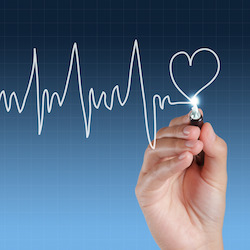Do you ask your patients if they have experienced a stress related event or  trauma. This new study shows that you may want to carefully watch these patients, especially within 6 months of the event. Stress related disorders – conditions triggered by a significant life event or trauma – may be linked to a heightened risk of cardiovascular disease (CVD), finds a large Swedish study published in The BMJ.
trauma. This new study shows that you may want to carefully watch these patients, especially within 6 months of the event. Stress related disorders – conditions triggered by a significant life event or trauma – may be linked to a heightened risk of cardiovascular disease (CVD), finds a large Swedish study published in The BMJ.
Most people are, at some point during their life, exposed to psychological trauma or stressful life events such as the death of a loved one, a diagnosis of a life threatening illness, natural disasters, or violence, write the authors. As this study shows, the risk of severe and acute CVD events, such as cardiac arrest and heart attack, was particularly high in the first six months after diagnosis of a stress related disorder, and within the first year for other types of CVD. And there is building evidence which suggests that severe stress reactions to significant life events or trauma are linked to the development of CVD.
But previous studies have mainly focused on male veterans or those currently active in the military with posttraumatic stress disorder (PTSD), or PTSD symptoms. And because of the smaller size of these samples, data on the effects of stress reactions on different types of CVD are limited.
So to shed some light on this, researchers used Swedish population and health registers to explore the role of clinically diagnosed PTSD, acute stress reaction, adjustment disorder, and other stress reactions in the development of CVD. They controlled for family background, medical history, and underlying psychiatric conditions.
The researchers matched 136,637 people from an “exposed cohort” who were diagnosed with a stress related disorder between January 1987 and December 2013 with 171,314 full siblings who were free of stress related disorders and CVD.
For each exposed person, 10 people from the general population who were unaffected by stress related disorders and CVD at the date of diagnosis of the “exposed” patient were randomly selected. Exposed and unexposed people were then individually matched by birth year and sex. For this study, CVD was defined as cardiovascular disease event (any; specific subtypes including ischaemic heart disease, cerebrovascular disease, emboli/thrombosis, hypertensive disease, heart failure, and arrhythmia/conduction disorder; or individual events) as an outpatient or inpatient visit.
The study found the following:
- Severe stress reactions to significant life events or trauma were linked to a heightened risk of several types of CVD, especially during the first year after diagnosis, with a 64% higher risk among people with a stress related disorder compared to their unaffected sibling.
- The findings were similar for people with a stress related disorder compared to the general population.
- And there was a stronger link between stress related disorders and early onset CVD – cases of disease which developed before the age of 50 – than later onset ones.Out of all studied CVDs, the excess risk during the first year was strongest for heart failure, and for major blood clots (embolism and thrombosis) after one year.
- There were similar associations across sex, calendar period, medical history, and family history of CVD. But those who were diagnosed with a stress disorder at a younger age had a heightened risk of CVD.
Researchers suggest that thought the underlying mechanisms are not entirely clean, there are potential mechanisms that have been proposed, such as, increased arterial blood pressure, which leads to favorable conditions for the onset of acute cardiovascular events, as well as hypertension, endothelial dysfunction, and arteriosclerosis. “In addition, the long lasting effect of severe stress reactions on cardiovascular risk is also plausible through prolonged biological disturbances (for example, inflammation, autonomic dysfunction, dysregulation of hypothalamic-pituitary-adrenal axis, and abnormal neurochemistry) and behaviour related changes (for example, smoking and sleep disturbance),” they write.
This is an observational study based on the Swedish population and, as such, can’t establish cause. The authors point out evidence from other studies suggesting a biologic link between severe stress reactions and cardiovascular disease development. And they can’t rule out the role of other unmeasured behavioural factors, such as smoking and alcohol intake.
But they say that their study is the first to explore the association between a number of stress related disorders, including but not limited to PTSD, and several types of CVD using sibling-based comparisons, among both men and women.
And doctors need to be aware of the “robust” link between stress related disorders and a higher subsequent risk of cardiovascular disease, particularly during the months after diagnosis.
“These findings call for enhanced clinical awareness and, if verified, monitoring or early intervention among patients with recently diagnosed stress related disorders.”
In a linked editorial, Professor Simon Bacon from Concordia University in Canada, says that the design of the study “allows us to make reasonable assumptions about the similarity of the environment, lifestyles, and health behaviours between those with a disorder and their paired siblings without one. Such assumptions allow inferences about other alternative potential pathways linking these disorders to CVD outcomes.”
In the future, well designed studies evaluating more appropriate interventions will be critical, not only to confirm the inferences of the new study but also to provide real benefits to patients,” he concludes.
Conclusion / “This population based, sibling controlled analysis showed a clear association between clinically confirmed stress related disorders and a higher subsequent risk of cardiovascular disease, particularly during the months after diagnosis of a stress related disorder, in the Swedish population. This association applies equally to men and women and is independent of familial factors, history of somatic/psychiatric diseases, and psychiatric comorbidities. These findings call for enhanced clinical awareness and, if verified, monitoring or early intervention among patients with recently diagnosed stress related disorders.”
Source: Huan Song et al. Stress related disorders and risk of cardiovascular disease: population based, sibling controlled cohort study. BMJ 2019;365:l1255 http://dx.doi.org/10.1136/bmj.l1255





